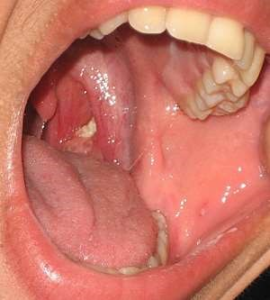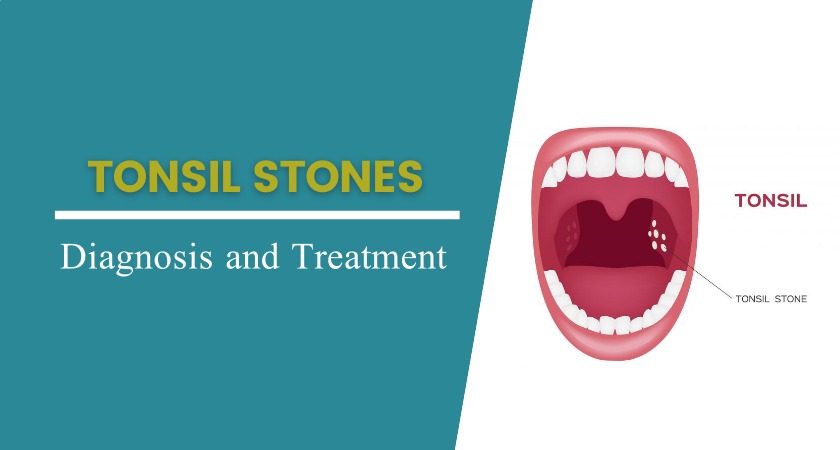Small but mighty tonsils are a pair of lymph nodes located in the back of the throat. Each tonsil composes of soft tissue mass. They have an important role in our body’s immune system to fight against infection, but sometimes can be susceptible to infection themselves.
Another type of tonsil-related ailment is tonsil stone, which mostly affects adults. Read to learn more about tonsil stone, causes, symptoms, and tonsil stones treatments.
.
 They are typically light yellow or white in colour but can be too deep in the throat, making it hard to see it at all. Three types of tonsil stone are:
They are typically light yellow or white in colour but can be too deep in the throat, making it hard to see it at all. Three types of tonsil stone are:
What are the Tonsils Stones?
Unlike other types of stones found in the kidney or gallbladder, tonsil stones (टन्सिल का पत्थर) are found in the mouth. Tonsils stones (also known as tonsilloliths) are calcium deposits of debris trapped on your tonsils. It occurs when food, dead skin cells, or mucus become lodged in tonsils leading to the rare form of bacteria causing infections. There are several factors that develop tonsil stones even tonsil cancer, If we do not get proper treatment on time. They are typically light yellow or white in colour but can be too deep in the throat, making it hard to see it at all. Three types of tonsil stone are:
They are typically light yellow or white in colour but can be too deep in the throat, making it hard to see it at all. Three types of tonsil stone are:
- Pharyngeal – The tonsil type found in the back of your throat
- Palatine – Located on the sides of your throat
- Lingual – Near the back (base) of your tongue
Causes of Tonsil Stones (टॉन्सिल स्टोन क्यों होता है)
Tonsils are made up of tunnels, crevices and pits referred to as tonsil crypts. Distinct types of debris can build up in these pockets. Bacteria feed upon this buildup, causing an odour. Over time, this food debris hardens into a one or small formation of tonsil stone. Causes of tonsil stone are many but often come down to poor oral hygiene and can start blood from tonsil stones. Here are a few common causes of tonsil stone:- Poor dental hygiene
- Chronic sinus problem
- Inflamed or large tonsils
- Allergies
Signs & Symptoms
The tonsil stone symptoms for tonsil stone include:- Bad breath
- Sore throat
- Hoarseness
- Cough
- White debris
- Swallowing difficulty
- Ear pain
- Pus or white discharge from the tonsils
- Swelling in tonsils
- Sleep disorders breathing
Diagnosis
Small tonsil stone is not noticeable. They are white or yellowish spots that may range in size of a pea. However, if they’re large, they can be easily visible and tonsil stones diagnosed completely.Preventing Tonsil Stones
The best thing anyone can do to prevent tonsil stone is to practice oral hygiene. Brushing your teeth twice per day and rinsing it with an alcohol-free mouthwash daily will help you keep your mouth and throat healthy. We also recommended paying a consistent visit to an ENT specialist to assure your throat is safe. However, gargling will not work for everyone. Sometimes, tonsil stone can be severe and may require invasive methods such as surgery. It is difficult to determine when the tonsil stone is severe and when it’s not. When in doubt, you must make an appointment with the doctor. Here are some home remedies to prevent tonsil stone naturally:- Gargling with salt water daily
- Consume plenty of water
- Quit smoking
- Avoid consuming alcohol
- Limit dairy consumption
- Treat sinus or allergy infections
- Reduce drinking carbonated beverages
Tonsil Stones Treatment and Surgery(टॉन्सिल का ऑपरेशन कब होता है)
The treatment for tonsil stone includes:- Medication: Your ENT doctor may advise antibiotics or tonsil stone medicine to reduce side effects or help to reduce bacteria but cannot treat the stone.
- Surgical Removal: An ENT surgeon will remove tonsil stone if unusually large or causing problems.
- Tonsillectomy: Long-term tonsils might require surgical removal through tonsillectomy It is a permanent method of tonsil stone removal or to treat tonsil stones.


